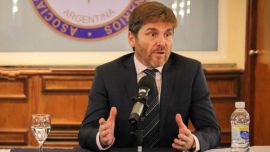Argentina’s political parties are not only disputing an electoral race – they’re also trying to increase their numbers of contributors in order to fund their campaigns for the PASO primaries and the race to come.
With certain visible differences, Argentina’s two main coalitions, the ruling rebrand Unión por la Patria and opposition challengers Juntos por el Cambio, are piling up funds at an accelerating pace, records show. Meanwhle Javier Milei’s La Libertad Avanza has only posted 70,000 pesos.
Using different channels – from the MercadoPago payment system to credit card donations ranging from 1,000 to 10,000 pesos, – Unión por la Patria has collected over 18 million pesos for its coffers to face the final run-up to the primaries, according to data registered by the Cámara Nacional Electoral courtroom.
In the last week six national officials have donated 100,000 pesos or more: Municipal Affairs Secretary Avelino Zurro, Public Innovations Secretary Micaela Sánchez Malcolm, Labour Secretary Marcelo Belotti, Interior Ministry Political Affairs Secretary Patricia García Blanco, Post Office head Vanesa Piesciorovski and Provinces Secretary Bruno Ruggeri from the portfolio headed by Interior Minister Eduardo ‘Wado’ de Pedro.
Those are not the only state workers putting money into the ruling alliance: María Inés Castillo of Lomas de Zamora (a figure close to Juan Grabois) chipped in 600,000 pesos and Juan Collado almost as much at 590,000 pesos ,while trade unionist Víctor De Gennaro’s daughter Julieta put in half a million. All of them work at the Social Development Ministry.
Juntos por el Cambio’s financing has other features with companies dominating the scene. For example, Global Zeg Monitoreo Sin Abono (an alarm and security firm) recently donated a million pesos, Establecimiento Las Marías two million, Tarjeta Naranja half a million and La Bragadense agricultural company 400,000 pesos. Among major contributors Banco Supervielle is listed as transferring 40 million pesos via two channels, with 16 million from Inurban Inversiones and four million from DesdelSur, a company linked to the Blaquier family, among others.
In this context Argentina’s libertarians have only slowly started to show the data of their contributors in the form of 15 names totalling 70,078 pesos. Consulted by Perfil, they point out that they will disclose the full totals of sums and campaign donors in due course, respecting the legal deadlines.
Left-wingers Frente de Izquierda de los Trabajadores – Unidad explained that they finance their expenditures via the state contributions given to each grouping via the Dirección Nacional Electoral board plus the contributions of party members, militants and sympathisers as well as the funds of the four parties forming the front.
“The payments until now have been made by member parties in cash but most of the spending in various items has been placed on account to be paid when all state funding and the contributions of militants as stipulated by our statutes have come in. No company finances us as they do Peronism, Juntos por el Cambio or Milei, besides which the main coalitions use the coffers of their governments to pay for their campaigns via hidden advertising,” they told Perfil.
The road map
The path for all parties to follow is based on Article 54 of Law 26,215 for financing which indicates that a report on spending must be delivered to the federal electoral courtroom 10 days prior to the election. That text must be accompanied by the signature of the authorities of each party, from the chairpersons to those responsible for the financing, and must include the public and private contributions received with indication of their origin and numbers, as well as the spending incurred. Then follows a further step: 90 days after the election, a final document on campaign inflow and outflow must be delivered, to be audited by the competent authorities.
Anti-money-laundering op
With an accent on the possible illicit financing of electoral campaigns, authorities of the Cámara Nacional Electoral (CNE) courtroom met with their Procelac (Procuraduría Especializada en Lavado de Activos y Financiamiento del Terrorismo) counterparts from the Attorney-General’s Office last week. The meeting took place on August 2 and the organisations exchaged notes helping to detect money of illegal origin supporting campaign activities.
Alberto Ricardo Dalla Via, who heads the CNE, highlighted the importance of the conclave and spoke of a series of courtroom initiatives with the aim of“combatting with effective tools the incidence of economic crime in the field of electoral law.” For his part, Diego Velasco, prosecutor-general and co-head of Procelac, underlined that this kind of activity helps to perfect techniques.





















Comments